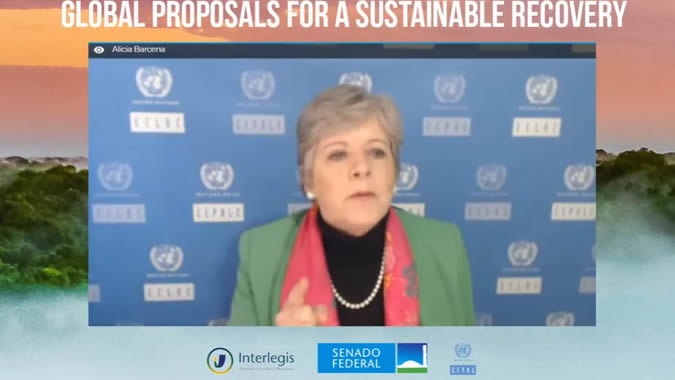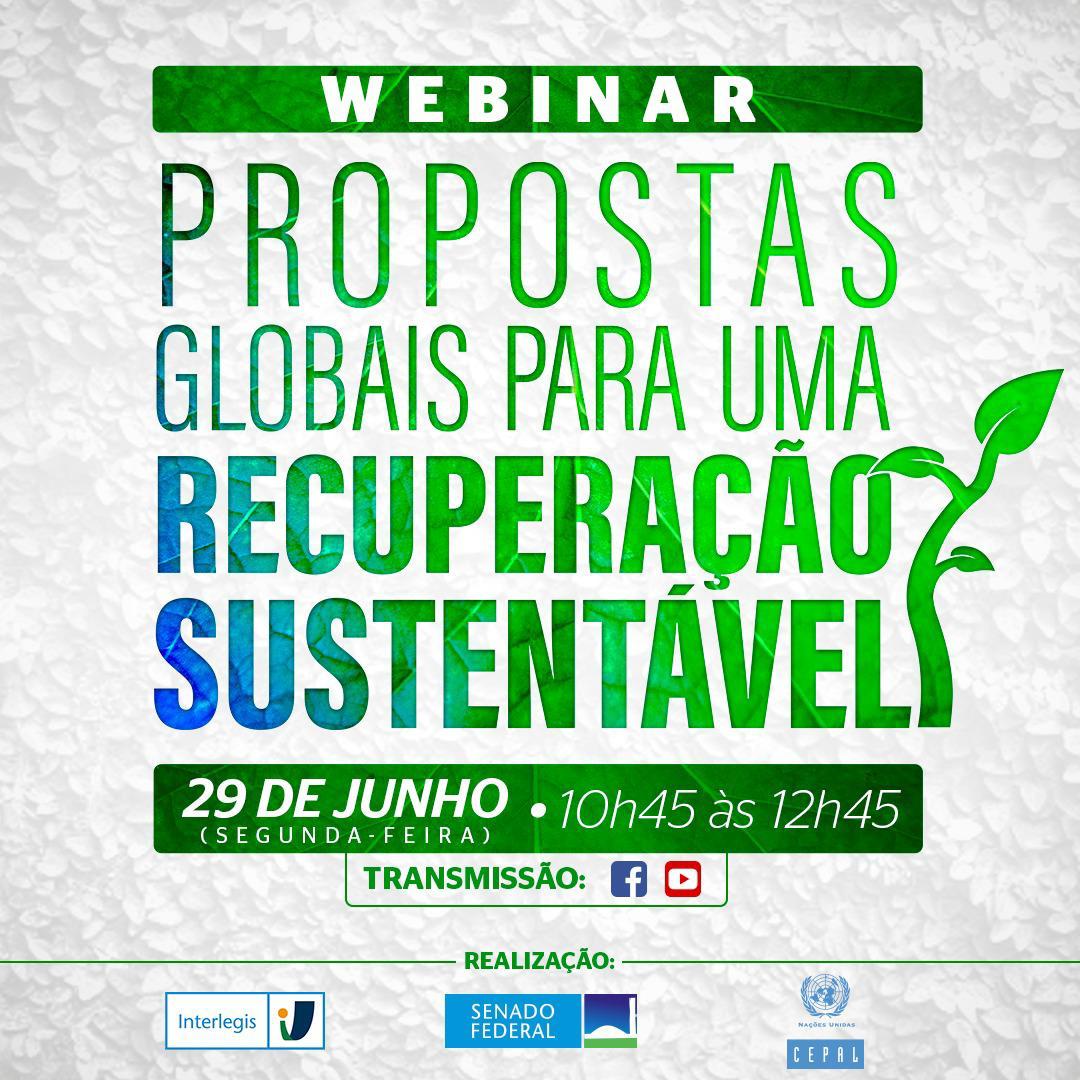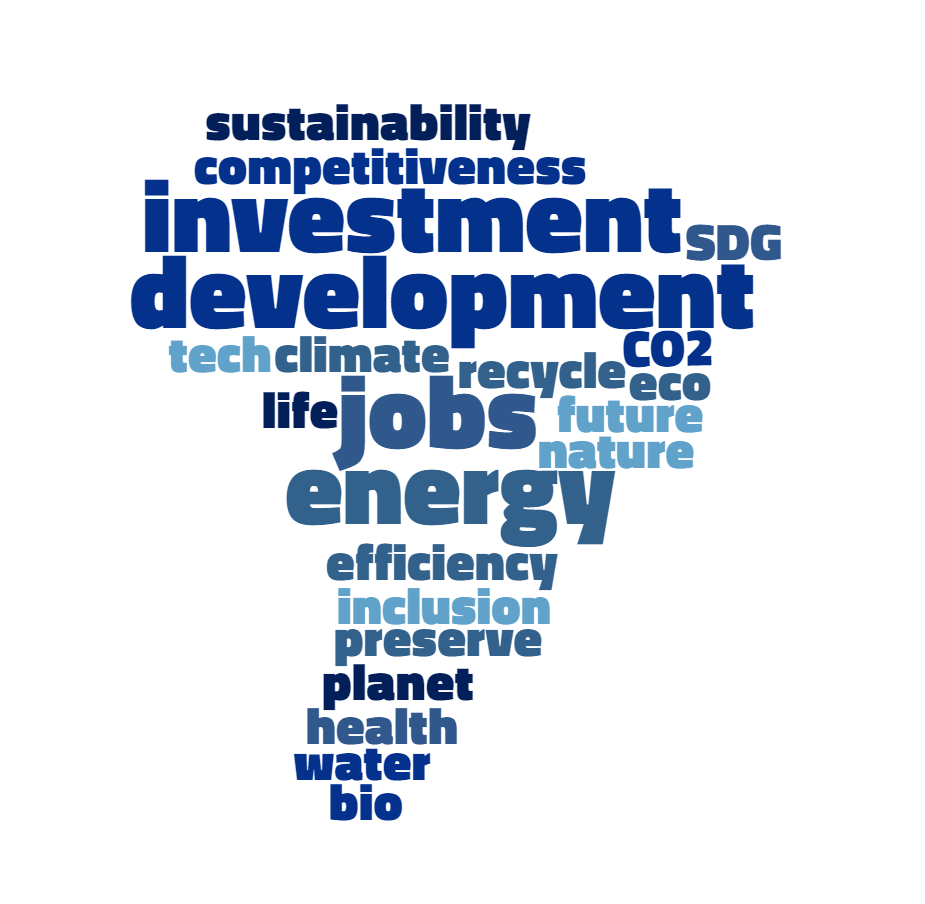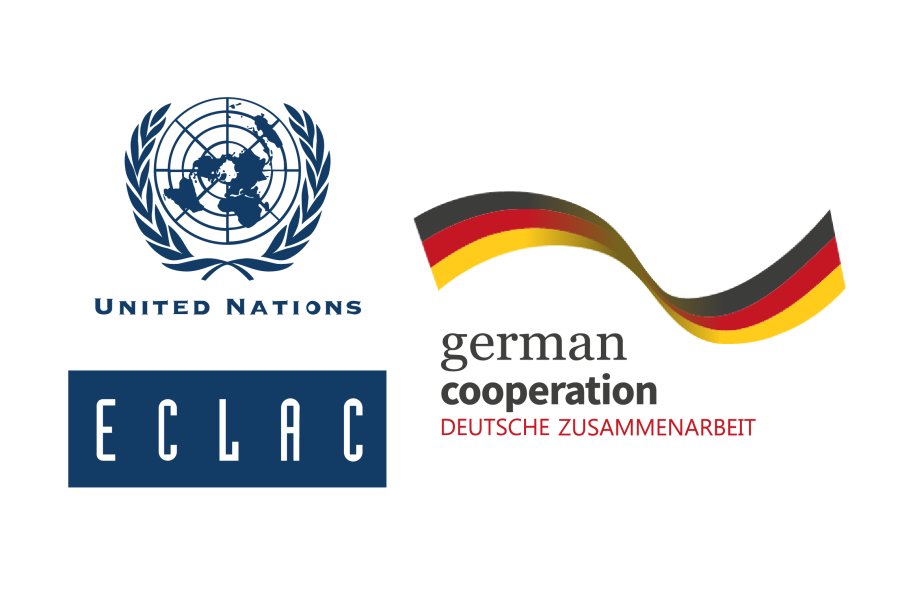ECLAC Calls for Moving Towards a Big Push for Sustainability as a Strategy for Emerging from the Current Crisis
Work area(s)
In a joint virtual seminar with the Federal Senate of Brazil, the commission’s Executive Secretary, Alicia Bárcena, emphasized that a new development model will be needed after the COVID-19 pandemic.

The crisis caused by the coronavirus pandemic is an opportunity to move towards a Big Push for Sustainability that would enable a new development model based on the 2030 Agenda for Sustainable Development, Alicia Bárcena, Executive Secretary of the Economic Commission for Latin America and the Caribbean (ECLAC), indicated today during a high-level virtual seminar organized in conjunction with the Federal Senate of Brazil.
The webinar entitled Global Proposals for a Sustainable Recovery was coordinated by the Federal Senate of Brazil and ECLAC’s office in Brazil, with support from the Cooperation Programme between ECLAC and the German Federal Ministry for Economic Cooperation and Development (BMZ) through the German Technical Cooperation (GIZ). Participants in the event included senators Fabiano Contarato and Jaques Wagner, Chairs of the Commission on the Environment in the Federal Senate of Brazil and of the Big Push for Sustainability Sub-Commission, respectively; Niky Fabiancic, United Nations Resident Coordinator in Brazil; Pascal Canfin, Chair of the European Parliament's Environment Committee and leader of the European Alliance for a Green Recovery; Debra Haaland, Congresswoman from the United States Congress; Carolina Schmidt, Minister of the Environment of Chile (via video); Senator Styvenson Valentim, Rapporteur of the Big Push for Sustainability Sub-Commission; and Senator Confúcio Moura, Vice Chair of the Big Push for Sustainability Sub-Commission.
The main presentation was made by Alicia Bárcena, who explained the impacts of COVID-19 in Brazil in a complex regional context, and why a sustainable recovery is urgent. She indicated that the COVID-19 crisis foreshadows the impact of the climate change emergency. Both are global public “bads” that arise from the abuse of nature, and inaction will have irreversible costs in both cases, she indicated.
The senior United Nations official specified that the current development model is unsustainable since it has led to weak economic and trade growth, with high inequality and the predominance of a culture of privilege, with negative externalities related to climate change and numerous systemic vulnerabilities that have been exposed by the pandemic.
“We must learn from this crisis to build back better. As the UN Secretary-General (António Guterres) said, ‘With the right actions, the COVID-19 pandemic can mark the rebirthing of society as we know it today to one where we protect present and future generations,’” she stated.
Alicia Bárcena recalled that the economic crisis being experienced by the Latin America and Caribbean region in 2020 will be the biggest in its history, with a contraction that will undoubtedly exceed the -5.3% that was forecast last April. In addition, the social impact will be deep, since it is expected that at least 12 million more people will be unemployed, which will drive nearly 29 million more people into poverty and an additional 16 million people into extreme poverty. In the specific case of Brazil, a -5.2% contraction is forecast for this year – with that figure currently under revision – along with a poverty increase affecting 5.9 million more inhabitants.
To face the crisis, ECLAC’s Executive Secretary detailed the five proposals that the Commission has promoted in recent months, which include providing an emergency basic income equivalent to one poverty line for six months to the entire population living in poverty; increasing fiscal space in the short term to design mechanisms that would allow for protecting income, jobs and companies, above all small and medium-sized enterprises; formulating responses in the medium term for a post COVID-19 world that will necessitate changes in the production structure, with greater equality and sustainability; fostering a welfare State that would include the universalization of access to rights, universal income and a system of care; and promoting regional and subregional integration.
“The world we find ourselves in needs a new development pattern, with equality and sustainability at its center. That is why at ECLAC we are promoting a Big Push for Sustainability, which is an approach based on coordinating policies to mobilize and accelerate sustainable investments that will fuel a new virtuous cycle of economic growth, with employment and income generation and a reduction in inequalities and structural gaps, while maintaining and regenerating the natural resources base on which development depends,” Bárcena indicated.
Brazil faces challenges and opportunities for building back better, she explained. The economic recovery should not be just “green” but multicolor in nature, in order to include all actors and all areas. Low-carbon investments can drive growth, but it is necessary to overcome challenges in terms of coordinating distinct policies and stakeholders.
In this area, she mentioned the repository of cases on the Big Push for Sustainability in Brazil, which ECLAC has made available to the community and which identifies more than 60 concrete cases of real actions that have been successful in promoting investments with positive impacts on the three dimensions of sustainable development (social, economic and environmental) in the South American country.
Alicia Bárcena also highlighted some examples of investments with positive social, economic and environmental effects in Brazil, such as the rapid expansion of wind power projects, which have already mobilized more than US$ 8.2 million and created over 250,000 jobs; the modern steel industry complex in the state of Ceará, with more than US$ 5 billion in investments and employing more than 50,000 people; community-led sustainable investments in the Amazon, which have strengthened indigenous communities; and investments in improving the agroforestry system in Rio Grande do Sul, which have increased productivity and generated income for rural communities.
In her presentation, ECLAC’s Executive Secretary also stressed that the Commission is supporting follow-up on the region’s medium and long-term development through the Regional Knowledge Management Platform for the Sustainable Development Goals in Latin America and the Caribbean, or the “SDG Gateway”, which includes activities, informational resources, statistics, regional data, specific analytical instruments and knowledge products developed and made available by the United Nations development system in the region in response to member countries’ needs. Contributing further is the COVID-19 Observatory, which compiles in a Geoportal the policy responses of each and every one of the 33 countries of Latin America and the Caribbean as well as analysis of the economic and social impact they will have on a national and sectoral level. The observatory also allows for a continuous comparative analysis of policies for protecting employment and companies and social protection measures, among others.
“We need a welfare State and universal social protection systems that include a new equation between the market and society. Public-private compacts are also needed for an agroecological transition, renewable energy, and the integration of digital technologies in production systems, along with progressive fiscal policies that would allow us to expand fiscal space, with incentives for equality and sustainable investment, job creation and the transition to a carbon-free economy. And finally, we need institutions and coalitions capable of formulating and implementing policies at the global, regional, national and local levels,” Alicia Bárcena concluded.
Related content


The impacts of COVID-19 in Brazil in a complex regional context. Why a sustainable economic recovery is urgent
Presentation by ECLAC Executive Secretary, Alicia Bárcena, in the webinar Global Proposals for a Sustainable Recovery, organized with the Federal Senate of Brazil.

ECLAC Presents Cases of Transformative Investments for a Sustainable Economy in Brazil
ECLAC’s Office in Brasilia, along with the Global Compact Network Brazil, held a “Big Push for Sustainability” webinar on May 26 in which more than 60 case studies on investments for sustainable…
Subregional headquarter(s) and office(s)
Related link(s)
Country(ies)
- Latin America and the Caribbean
-
Brazil
Related project(s)
Contact
Public Information Unit
- prensa@cepal.org
- (56 2) 2210 2040
